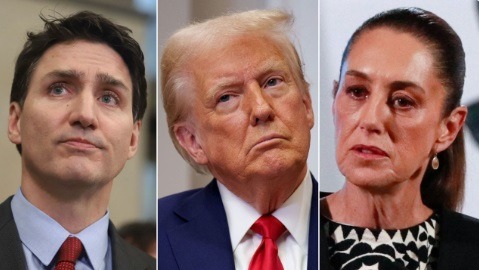Your blog postCanada and Mexico Retaliate with Tariffs Following Trump's Trade Measures
BUSINESSNEWS


Trump Imposes New Tariffs on Mexico, Canada, and China, Triggering Retaliation
President Donald Trump has announced significant new tariffs on Mexico, Canada, and China, signing the measure at his Mar-a-Lago club on Saturday. The tariffs, aimed at curbing the flow of drugs and undocumented immigrants into the United States, risk raising prices for American consumers on a wide range of goods, including avocados, sneakers, and cars.
In response, Mexico's President Claudia Sheinbaum confirmed retaliatory tariffs, and Canadian Prime Minister Justin Trudeau announced similar levies, which will affect $155 billion worth of American goods. China's Ministry of Commerce declared plans to file a complaint with the World Trade Organization and promised countermeasures.
The new tariffs represent a major shift in U.S. trade policy, undoing years of duty-free trade between the U.S. and its North American neighbors, and escalating tensions in the ongoing trade war with China. The tariffs will impose a 25% duty on imports from Mexico and Canada, and a 10% tariff on Chinese goods, with no exemptions.
Trump's executive order, which invokes the International Emergency Economic Powers Act, will take effect Tuesday at 12:01 am ET. The policy also closes a loophole allowing small shipments to enter the U.S. tax-free, a move aimed at improving customs enforcement. While the tariffs are framed as a response to illegal immigration and drug trafficking, Trump did not provide clear benchmarks for when they might be lifted.
The tariffs have been met with fierce opposition from business groups, who warn that they will lead to higher costs for consumers, disrupt supply chains, and potentially cost jobs. Corporations and trade groups, including the U.S. Chamber of Commerce and the American Petroleum Institute, have criticized the tariffs, urging the administration to reconsider its approach.
The tariffs could significantly impact various industries, including agriculture, energy, and manufacturing, especially since Mexico and Canada are key U.S. trade partners. With retaliatory measures already underway, the situation has the potential to escalate into a full-blown trade war, further complicating the economic landscape.
